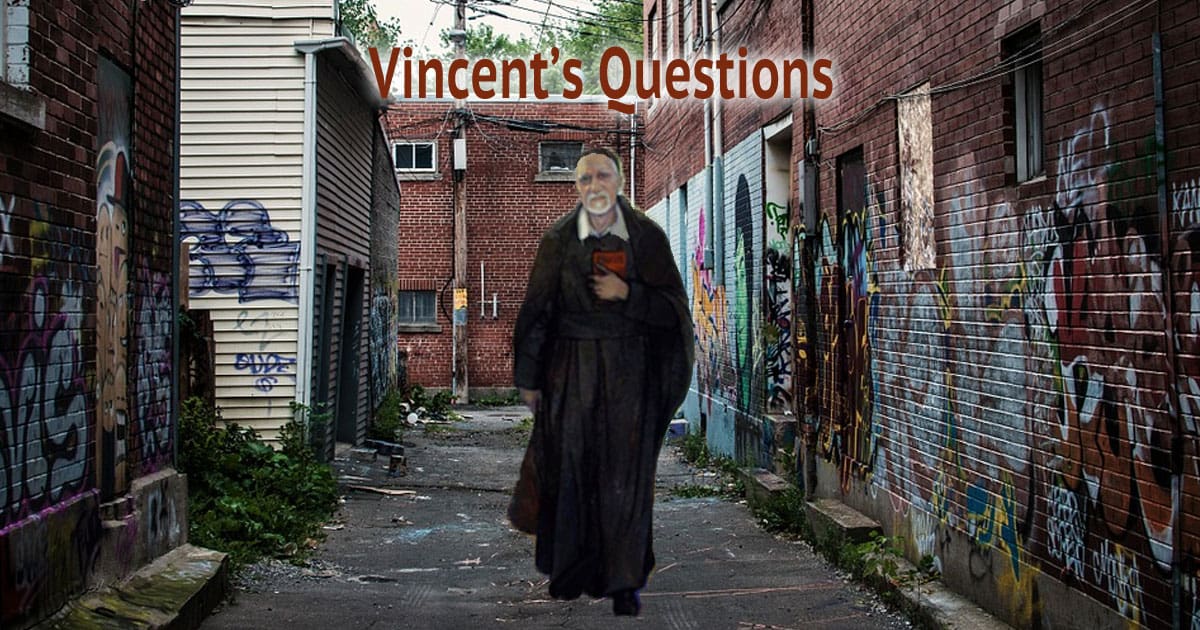Are We Loved Enough?
 As Jim Cormack, CM describes it in his reflections on the questions he thinks Vincent ask himself… “The next question may seem unusual or even ironic, but it is central in a life of service. Are we loved enough?”
As Jim Cormack, CM describes it in his reflections on the questions he thinks Vincent ask himself… “The next question may seem unusual or even ironic, but it is central in a life of service. Are we loved enough?”
Continuing the series of reflections on service to the marginalized, Fr. Jim prefaces his reflections with the thought we must be stripped of the hardness of middle life or experience.
There is another stripping or changing that needs to be addressed. Vincent served his whole life, he did not do his required time and then pass on to something better. If we would serve our whole lives then we must be stripped of the hardness of middle life or experience. This is an acquired hardness of heart, often not malicious but hard nonetheless. We live with evil; the real and destructive effects of poverty and racism are all around us. We are not starry-eyed youths, not bleeding hearts. One doesn’t trifle with evil. We grow hard, hard and smart, street smart. And it is this hardness of heart born of experience that must be stripped, or we cannot serve with the life and power of Christ.
We are not required to be stupid to serve; we are required to love. It requires a real letting go to love when our hearts want vengeance and our minds supply the ready and real rationale. Vincent’s service, in imitation of Jesus, was one of faithful, effective, love. Vincent saw and was troubled. He knew the touch and power of evil, but he chose to love. The stripping away of this hardness allows the true servant to stand against evil always with power while not needing to conquer it. True servants are people who stand for what is right and who constantly and consistently call that forth in others. They are people who love and trust, forgive again and again, accept the harsh and dreadful truth of the cross, and find the fullness of life. Thus enlivened, they bring service that will not be measured or hard to those in need. Life teaches. But we ask, “Are we stripped enough to learn what both the truth and life of the cross is?”
He then comes to the crux of matter.
The next question may seem unusual or even ironic, but it is central in a life of service. Are we loved enough? Are we loved and thus filled with life and power that must flow out of us? It is necessary to live and act in such a way as to know and experience God’s love for all.
The question is not just do we pray? Prayer, of course, is essential. We must trust the loving plan of God, look for its manifestations in the often small, but real daily events, which are the marks of the Kingdom.
We must see God’s love reaching and touching us, filling us and holding us.
True love of self allows others to love us. Too often dedicated men and women allow their spirit and drive to dry up because they will not, or cannot know love. It can be such risky business, but there is no graced ministry without love and love’s risks.
We can love self not in a possessive, competitive way, not setting love for self as a threat for the love of others. We can cherish who we are, who we can be, and do and allow the love of others to strengthen us, console us, teach us to laugh and allow us to weep.
Will we stand alone, or will we stand with others, being a part of what is good in them, being more together than ever we could be alone? Our sisters and brothers in the body of Christ touch us, change us, soften us, and call us forward with their love.
Finally, he raises the question behind the phrase “those who are poor evangelize us!”
Lastly in this matter of love, do we allow the ones we serve to love and respond to us as they are able? When we are worn and tired, pulled by too many needs and demands, by an endless array of sadness and sorrow, we easily can ask “who takes care of the caretakers?” And we must admit we often close the door of service and love to us because we say we must always be the givers, the ones who do for others. Many times we keep the ones we serve from helping us. We create structures of help that effectively keep any reciprocity of care at bay. Often we image the poor as being always in need, blind to the many ways they can give to us. They may not be able to give what we give, or precisely what we need at any given moment. But reciprocal giving does happen, if we look for it and are willing to see the poor as real, as Christ for us, and if we are willing to accept what they can give. The poor are our privileged place of God’s revelation, calling us to faithfulness and a new vision.







0 Comments